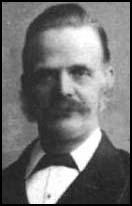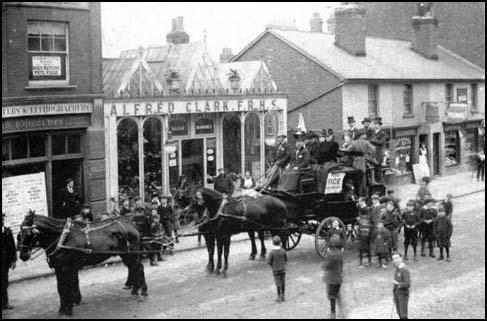Joseph Rice

Joseph Rice, the son of a farm labourer, was born in East Grinstead in 1855. Joseph's grandfather, Thomas Rice, was brought up in East Grinstead Workhouse. William and Elizabeth Rice could not read or write but managed to send all their children to East Grinstead Council School.
After a brief schooling, Joseph joined his brothers, Thomas, Henry and George as apprentices at William Charlwood's harness-making business. All the boys were taught their trade by William Charlwood's foreman, John Brinkhurst.
In 1876 Joseph and Thomas Rice opened their own saddle-making business. It was a great success and the brothers were able to expand into selling agricultural implements. By 1890 Rice Brothers had shops in Edenbridge, Lewes, Hayward Heath, Horsham and Uckfield.
Joseph Rice married Sophia Baker on 18th March, 1884 and lived at Wesley House. Joseph Rice held strong religious beliefs and for thirty years was a Sunday School teacher at Zion Church. He was also treasurer of the East Grinstead's Temperance Society.
Joseph Rice was a leading figure in the local Liberal Party and in 1900 was elected to the East Grinstead Urban Council. He remained on the council for twenty years and was chairman in 1905, 1909 and 1912. With the support of other Liberals such as Edward Steer, Thomas Isley and Thomas Hartigan, Joseph Rice campaigned for subsidized council housing and the purchase of Mount Noddy. In 1905 Joseph Rice became the first tradesman to be elected Chairman of East Grinstead Urban Council.
Although heavily involved in politics, Joseph Rice continued to expand his business interests. He 1912 he opened North Sussex Garage where he sold motor cars, petrol, tyres, etc. During the First World War Joseph Rice's engineering company at Oxted made shells, 10 cwt bombs and aeroplane parts. Joseph Rice died 10th July, 1935.

Primary Sources
(1) Joseph Rice, Memoirs (1921)
Our grandfather, the original Thomas Rice, was brought up in the East Grinstead Union Workhouse. He was a farm labourer all his life and he knew what it was to have some hard times. My father, William Rice, began life as a farm labourer, and finished as an underwood dealer and mail contractor, and could neither read nor write his own name.
My father worked for Long John Turner at Boyles Farm, East Grinstead. As a farm labourer, he was earning the princely sum of 12s a week. Of this sum, 10s was needed to purchase the "grist" of flour. His wife had to work the wash tub early and late to keep body and soul together, and to keep the wolf from the door.
My father was threshing corn in the barn when his employer said to him: "I hear that your missus has got another kid. You will soon want a workhouse to keep your lot in." "Damn your eyes," said the old man, "this is the last day's work I do for you." He threw down his flail, and jumping over the barns bay, he made his way to East Grinstead and obtained employment there, and this terminated the Rice family's work on the land.
(2) East Grinstead Observer (25th January, 1902)
Joseph Rice and friends gave the inmates of the workhouse an entertainment on Wednesday, 22nd December. Eighty-five were entertained at the Queen's Hall. The fare included was of a sumptuous character and included hot roast, and boiled beef and mutton with vegetables, followed by plum pudding, jellies and mineral waters. Dinner over, the old men were provided with pipes, tobacco, cigars, cigarettes, fruit, nuts and minerals. The infirm, who were unable to get to the Queen's Hall, and about 30 were given a poultry dinner, while in the afternoon they were entertained by Edward Steer with a gramophone and later William Miles amused them with a lantern entertainment. In addition to the good things already named, each inmate was presented with a sixpence.
(3) East Sussex News (4th September, 1903)
Another stage in the 'Passive Resistance Movement' at East Grinstead was reached on Monday when nine ratepayers were summoned at the Petty Sessions for refusing to pay the poor rate, which includes a small portion devoted to educational purposes.
Joseph Rice, assessed at £2 2s 6d, sent a cheque for £1 15s - deducted 7s 6d for educational rate. Rice said "I object to Rev. Crawfurd and Mr. Stenning on the bench. Mr. Stenning is an interested party, being a manager and part-owner of a so-called Voluntary School." He added that "this was essentially a fight between the Church of England and the Free Church." Joseph Rice had to be taken from the court by force.
(3) Joseph Rice, speech at the East Grinstead Urban Council on 14th April, 1904)
For over twenty years East Grinstead had a School Board in the town and Churchman and Nonconformists were fairly represented on it. Now gentlemen from Lewes, who know nothing about the circumstances of East Grinstead have appointed Robert Whitehead. The Committee, as chosen by the County Council, consisted of five Churchmen and one Free Churchman, one-sixth only of the representation for Nonconformists, though 450 of the 800 children in the Board Schools had Nonconformist parents.
(4) Joseph Rice, speech quoted by the East Grinstead Observer (5th August, 1905)
Forty-five boys and ten girls were playing on the proposed recreation ground at Mount Noddy - but they were trespassers. My firm and my relatives would be prepared to present a number of seats and trees for the recreation ground.
(5) East Grinstead Observer (22nd April, 1905)
The election of Joseph Rice as chairman of the East Grinstead Urban Council marks an entirely new departure on the part of that body. It is the first time a member of the trading community has been elected to that honourable position. By the choice made, the Council had recognised the claims of a class which really forms the very backbone of East Grinstead society and which is the chief contributor to the rates in the district. Many people entertain fears for the future. For my part, I have none.
(6) Joseph Rice, acceptance speech quoted by the East Grinstead Observer (19th April, 1905)
As a man who started life at the plough, to be called on to fill the highest post which a town could offer a person was a great honour. I am the first tradesman to occupy such a position. I have helped build up two of the largest businesses in the town and had been intimately connected with five. All my interests are vested in the town so I have its welfare at heart.

